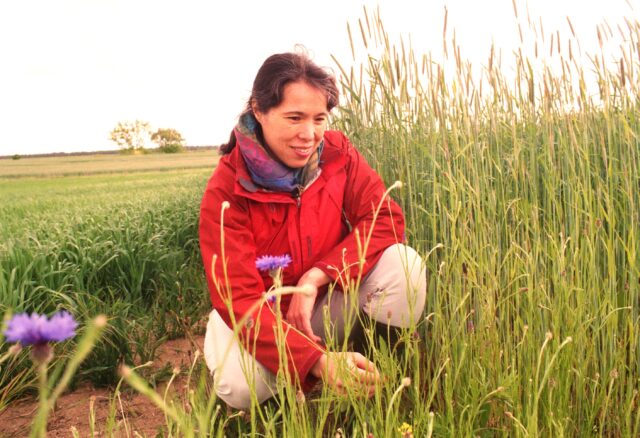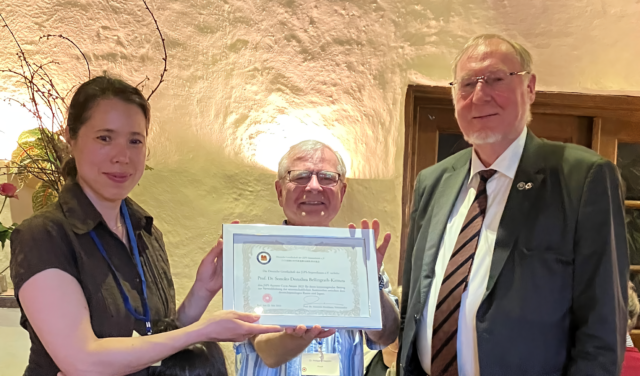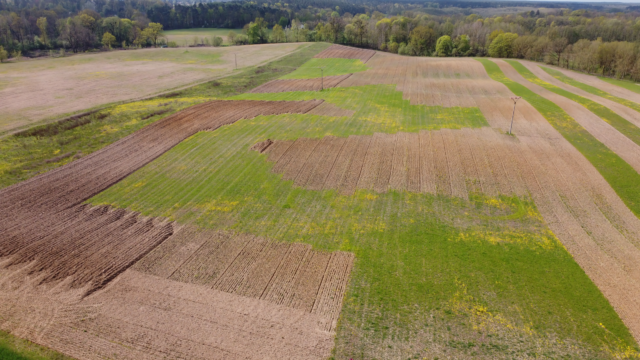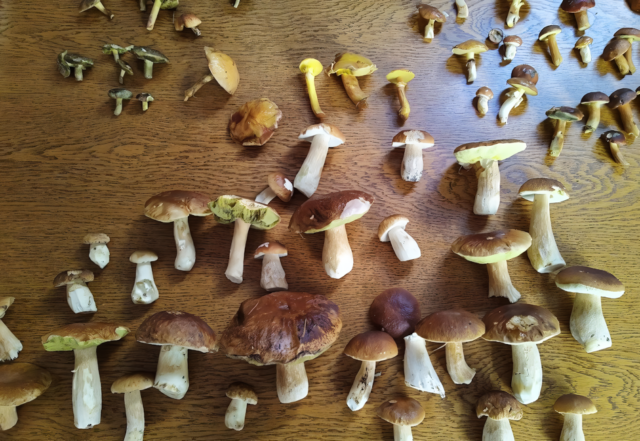Letters from HUAP (until 2024)
Dr. Sonoko Dorothea Bellingrath-Kimura
When Hokkaido University offered me a partner position, I was very happy to be connected to my alma mater and my desire to go to Sapporo again grew stronger. I have Hokkaido University pamphlets in my office to present the appeal of the University to visitors. Many people in Germany have heard of “Hokkaido” and “Sapporo”, which is associated with good impression, such as Snow or delicious pumpkin named “Hokkaido”. Many members of the association of alumni of the Japan Society for the Promotion of Science (JSPS) in the German-speaking area have been to or have acquaintances in Hokkaido. When I see graduates of Hokkaido University or participants of the summer programs, I feel like I’ve known them for many years.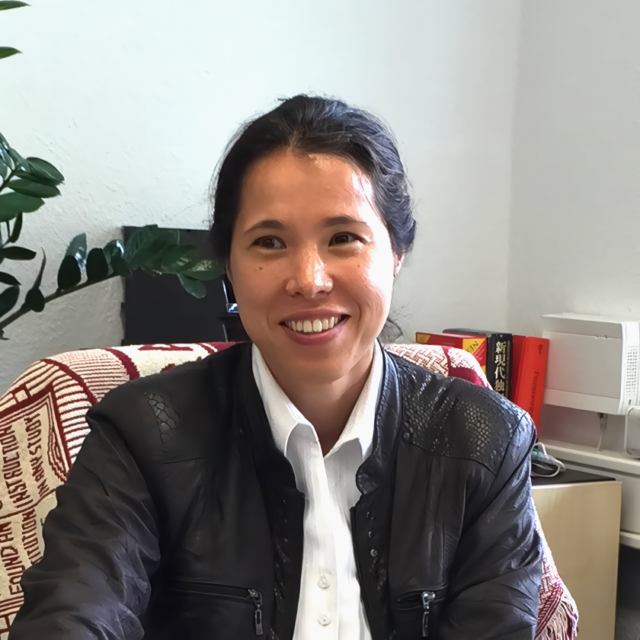
I’m happy that the Graduate School of Global Food Resources and other organizations of Hokkaido University are currently active in fostering international human resources and research activities. I am also conducting a joint research project with the Laboratory of Soil Science for which I am receiving Grants-in-Aid for Scientific Research. I’m planning to visit places where I studied when I was in the doctoral course, and I’m looking forward to it. I’d like to interact with current students of Hokkaido University and to receive them as exchange students in the future. When some people from the German agricultural machinery industry sought my advice because they wanted to observe Japan’s smart agriculture, I recommended Hokkaido and a visit by their delegation to Hokkaido University was realized.
Since the pandemic started, online meetings and communications through instant messengers have become common, and it has become possible to work efficiently and flexibly from home or other places. Even so, I feel it is important to meet people in person, because small talk you have with someone you run into may sometimes develop into discussions about research activities. I think online and in-person communications should be combined effectively in the future.
I currently live in the State of Brandenburg, about 30 minutes by train from the east of center of Berlin. It is a northern region, but it does not have as much snow as Sapporo. The nearby city of Fürstenwalde has a plant of the Beer Brewery, which advertises to be the roots of Sapporo Beer. I was very surprised to find a slide show of the streets of Sapporo, the Clock Tower, and Odori Park at the plant. In Germany, many peopleenjoy hiking and walking on holidays, and the entrances to forest roads are lined with cars in the mushroom-picking season. (Locals know the secret places, and so do I!)
Cycling tourism is also popular, and projects to link bioeconomy and cycling tourism are conducted mainly in the Lausitz region with its old brown coal mine sites. Co-development-
type research involving the stakeholders is recommended, and the research style is changing
in the direction of conducting research, development, and innovation simultaneously under the
name of Living-Lab. This is necessary to provide research results promptly to meet the on-site needs and address climate change “now”. Research on “right crop for right site” intended to identify optimal ways of utilizing agricultural land is currently conducted with the aim of improving ecosystem functions of soil besides food production, including carbon accumulation and groundwater preservation through smart agriculture.
I was able to spend nine wonderful years at Hokkaido University. I want to tell everyone at Hokkaido University that you can be proud of your university in the world. Please value your ties expressed in the Miyako zo Yayoi dormitory song.
- At a field of the Humboldt University of Berlin
- Receiving the JSPS Alumni Award 2023
- A “right crop for right site” model field to maximize ecosystem services
- Mushroom-picking harvest
北海道大学からパートナー就任のお話をいただいたとき、母校との繋がりを持てたことが嬉しく、札幌にもまた行きたいという思いが強くなりました。私の研究室には北大のパンフレットを置いていて、訪問者に北大の魅力を紹介しています。ドイツでは「Hokkaido」や「Sapporo」の
名前を知っている人が多く、一般的に売られている食用カボチャには、なんと「Hokkaido」という名前がついた品種があります。また、ドイツ語圏の日本学術振興会(JSPS)研究者同窓会の中にも、北海道に行ったことがある人や知人がいるという人が多いですし、北大の卒業生やサマープログラムの参加者に会うと、みんな昔からの知り合いのように感じられます。
現在の北大では、国際食資源学院などをはじめ、積極的に国際的な人材の育成や研究活動をしていて嬉しく思います。私自身も、北大の土壌学研究室と科研費の共同研究プロジェクトを進めていて、博士課程在籍中に調査した場所を再び訪問する予定で、今からとても楽しみにしています。現在の北大生とも交流して、将来的には留学生として受け入れたいと考えています。また、以前には、ドイツの農業機械業界の方から、日本のスマート農業を視察に行きたいという相談
を受けて、北海道を推薦し、視察団の北大への訪問が実現しました。
パンデミックを経て、オンラインミーティングやチャットでのやり取りが普通となり、自宅などでも効率良く柔軟に仕事ができるようになっています。それでも、偶然会った人との雑談から研究活動の話に発展することもあり、直接会うことも大切だと感じています。今後はオンラインとリアルの両方をうまく組み合わせて使っていくべきだと思います。
私が今住んでいるのはベルリン中心部から電車で東に30 分ほどのブランデンブルグ州です。北国ですが札幌のように雪は多くはありません。近くのフュルステンバルデという都市には、サッポロビールのルーツとされているベルリンビール醸造会社の工場があり、工場には、札幌の街並み、時計台、大通のスライドショーがあってとても驚きました。休日にはハイキングや散歩を楽しむ人が多く、キノコ狩りの季節には林道の入り口に車が並びます(地元民は秘密の場所を知っ
ています、私もです!)。
また、サイクリング・ツーリズムも盛んで、バイオエコノミーとサイクリング・ツーリズムを繋げるプロジェクトが、褐色炭採掘跡地が広がるラウジッツ地方を中心に行われています。研究
でも、ステークホルダーを巻き込んだCo-Development 型が推奨されていて、Living-Labという名称で、研究と開発、イノベーションを同時に行う方向にスタイルが変わりつつあります。現場のニーズに合わせ、研究成果をすぐに提供し、気候変動への対応を「今」行う必要があるからです。現在は「適地適作を1つの圃場内でどのように行えるか」という研究が進められており、スマート農業を使って、炭素蓄積や地下水保全といった食料生産以外の土壌の機能を使う生態系サービスの向上を目指しています。
私は、北大で9年間素敵な時間を送ることができました。北大の皆さん、北大は世界に誇れる大学です。「都ぞ弥生」の繋がりを大切にしてください。
- At a field of the Humboldt University of Berlin
- Receiving the JSPS Alumni Award 2023
- A “right crop for right site” model field to maximize ecosystem services
- Mushroom-picking harvest


